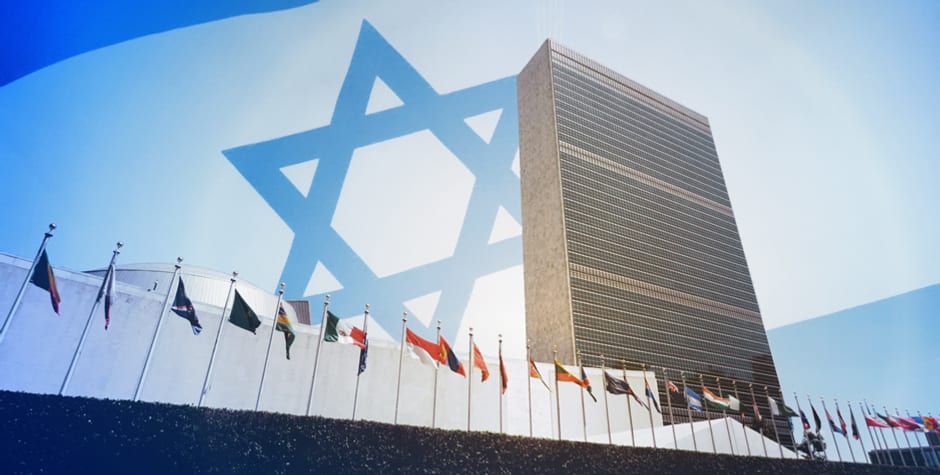The U.N. Keeps Getting It Wrong, Allowing Palestinian Leadership To Dismantle Any Effort for Peace With Israel – What the ACLJ Is Doing About It
In April (and again in August) 2020, we told you about how Palestinian leadership continues to disrupt the Israel-Palestine peace process. We also explained how, for the last several years, through our international affiliate, the European Centre for Law & Justice (ECLJ), we have sent a letter each month to the incoming United Nations Security Council (UNSC) President explaining the problems associated with the attempt by Palestinian leaders to obtain U.N. recognition of a Palestinian state.
Our most recent letter was just sent to Ambassador Nicolas de Rivière, who is the Permanent Representative of France to the U.N. He is the UNSC President for September 2022.
As we discussed in our last update, because five new States join the UNSC every calendar year to replace five States that leave the UNSC, the new States have to be informed about certain issues – like the ongoing attempts of the so-called “State of Palestine” to convince the UNSC to compel Israel to accept Palestinian statehood on the Palestinian Authority’s terms. Each State needs to know that while Israel has made numerous reasonable (and many would even say generous) offers to Palestinian leaders for peace and a two–state solution, Palestinian leaders continue to thwart Israel’s good–faith efforts.
Not surprisingly, the U.N., an organization notorious for its anti-Israel bias, has fully supported these unsettling Palestinian tactics.
Much like our past letters, we explained in our most recent letter to Ambassador Nicolas de Rivière:
[O]n 29 November 2012, the UN General Assembly (GA) agreed to change the Palestinian Authority’s (PA) status at the UN from an “Entity” enjoying Observer status to that of a “Non-member State” with Observer status. It is important to understand that the GA’s actions did not—indeed, could not—create a Palestinian State. Moreover, despite the status change decision (and a more recent move at the UN to treat Palestine as a “State”), the reality of Palestinian “statehood” is belied by the fact that Palestine does not meet the customary international law requirements for statehood, nor does any UN entity possess the authority to create a state where one does not otherwise exist.
*****
Previously, on 23 September 2011, officials from the Palestinian Liberation Organisation (PLO) submitted their application to the United Nations seeking UN membership of an Arab Palestinian State in the West Bank and the Gaza Strip. To date, there have not been nine affirmative votes in the Security Council to admit such a “state”, the number required by Article 27(2) of the UN Charter.
*****
[And] in the 1990s, the PLO consented to negotiate with the State of Israel with the aim of resolving the disagreements between them. The various agreements between the State of Israel and the PLO / PA were negotiated and concluded under the auspices of the international community. Specifically, in the Interim Agreements, the PLO agreed to refrain from acts intended to change the status of the territories outside of peace talks. The Palestinians’ attempt to forego such negotiations by appealing directly to the UN constitutes a material breach of prior Israeli-Palestinian agreements and subverts the international rule of law. It also indicates that Palestinian agreements cannot be relied upon—Palestinian officials readily breach their word when it suits their purposes.
In our letter, we also pointed out:
[T]he UN does not officially recognise states or declare statehood; such actions are the responsibility of individual governments:
The recognition of a new State or Government is an act that only other States and Governments may grant or withhold. It generally implies readiness to assume diplomatic relations. The United Nations is neither a State nor a Government, and therefore does not possess any authority to recognize either a State or a Government.
In light of the fact that no UN agency has authority to recognise or declare statehood, the November 2012 General Assembly decision to change the status of the PA at the UN from “Entity” with observer status to “Non-member State” with observer status is solely an internal administrative change for the UN and its agencies. It does nothing to change the actual status of the PA in fact.
To demonstrate further the true nature of the ongoing “negotiations” between Israel and the Palestinians, this last point from our letter must also be mentioned:
[W]hile President Abbas makes statements about peace and a two-state solution, Palestine’s teachers and media are educating the children to believe that Israel does not even exist. In fact, the logo of the Permanent Observer Mission of Palestine to the United Nations omits Israel completely from the territory of the former Palestine Mandate, signifying Palestinian refusal to recognise Israel’s legitimate existence.
Once again, let’s be honest. Palestinian leaders are using the U.N. as a means to get some sort of international recognition while sabotaging direct negotiations with Israel. The sham is over. Many, though hardly enough, in the international community recognize this fact.
That is why we continue to point out these troubling issues to you and to each incoming UNSC President. And that is why we continue to stand strong with Israel in a variety of other ways as well (see here and here, for example).
